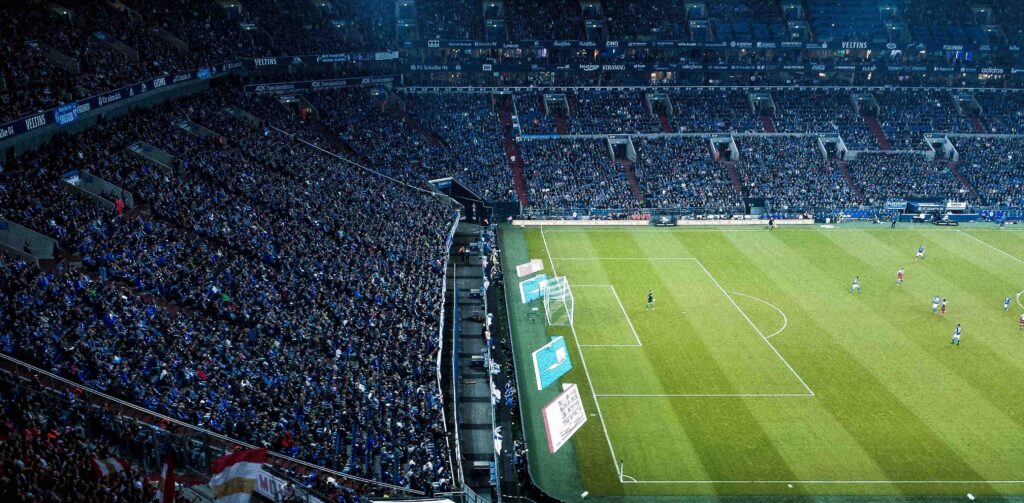A one-man show in football, but one that collapses just as quickly as it started. What fits the 60-hour European Super League is nothing new, but an old pattern. This is also the case one year later.
In football, too, nothing is eaten as hot as it is cooked. Neither in 2021 the European Super League – nor in 1920 the founding of the first German professional club, to which the DFB reacted with a show of force by threatening all players and clubs involved with bans. The association wanted to maintain amateur status for football across all leagues. The threatening gesture worked. Only a few fans attended the only two games of the 1st German Professional Football Club Berlin and the main initiator, Otto Eidinger, went bankrupt.
The DFB as preserver of „good old football“ in Germany
101 years ago, football in Germany really started to boom and to flush money into the coffers of the associations and club owners. The players wanted to get their share, but the DFB renewed its amateur statute several times in the 1920s: Yes to football, no to pay. Even before the First World War, it was common practice for the top clubs of the time to pay their star players, albeit only under the table: money, bonuses, pleasant jobs or the provision of a furnished flat were the usual forms of remuneration with which the players could compensate for the loss of work and thus wages in their profession.
Nevertheless, even in the 1910s it was obvious that football was business-driven. The growing interest in the sport led to equally rising expectations. To fulfil them, both better training and better players were needed – and thus more money, which was to be covered by spectator income. The more successful the club, the more spectators, but success required better and better trained players.
The European Super League between dominance and concession
In the same way that the European Super League has now only been stopped, but not died, the development in Germany was also about 100 years ago: there were a few top clubs in the regional leagues whose best-placed teams determined the German champion among themselves in play-off matches at the end of the season.
Clubs like Hamburger SV, FC Nuremberg, FC Bayern and FC Schalke 04 criticised the DFB’s sporting appropriation of football: it was obvious that football was no longer just for physical training for potential soldiers, but also for the entertainment of the general population. But the DFB stuck to its line and from February 1925 had the clubs and players controlled even more closely. One consequence was that the national team could no longer play a match that year because the players lacked the time to train and compensation for training time was contrary to the DFB amateur statute.
In 1930, the same thing happened in Gelsenkirchen as had happened in Preston, England, in 1885: the DFB made an example, declared 14 Schalke players to be professional players because of the compensation they received and banned them. This time, however, the other side also flexed its muscles and reported various other undercover professional players to other clubs. The other clubs, however, did not react in a snubbed manner but showed solidarity with FC Schalke 04. The DFB feared a loss of power and lifted the bans.
Signs of a rethink at the association? No, on the contrary. Because after its brief concession, the DFB declared a renewed rejection of professional football. Apparently it fancied itself as the tone-setter and did not reckon with what was to happen in October 1930, which in turn is reminiscent of April 2021: there was a meeting of several major German clubs, at the end of which there was agreement on the German Professionalism Reichsliga. But contrary to the developments of the Super League, several months of discussions around power and economic strength followed. In the end, there was a reform steered by the DFB that made the clubs give in.
A look into the crystal ball
So what does this mean for the Super League? Football cannot get rid of the ghosts that its popularity has called forth. The spiral of modern football will go on and on. The rapid end of the Super League, however, also shows the influence of fans and fan organisations, not least via social media: we may not be able to stop their spinning movement, because for too many football is really just entertainment. But the speed of the turning movement can be slowed down – as has just happened.
A quote put into Mark Twain’s mouth is: History does not repeat itself, it rhymes. This is also true time and again of this procedure in football.
And history shows: events like the Super League are not new and the future cannot be stopped, but we can shape it.

